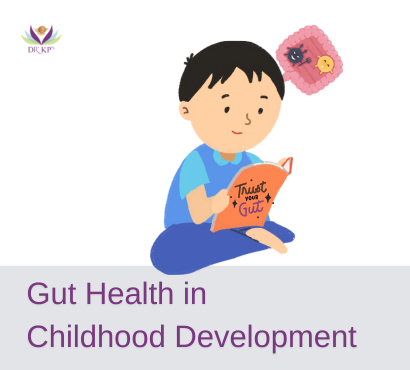The human gut is home to trillions of microorganisms collectively known as the gut microbiome. In children, this complex ecosystem plays a pivotal role in various aspects of development, including digestion, immunity, and even brain function. Understanding the significance of gut health in childhood is essential, especially in the Indian context where dietary habits and environmental factors uniquely influence the gut microbiome.
Understanding the Gut Microbiome
The gut microbiome comprises bacteria, viruses, fungi, and other microorganisms residing in the digestive tract. These microbes aid in breaking down food, synthesizing vitamins, and protecting against harmful pathogens. In children, the gut microbiome is particularly dynamic and undergoes significant changes during the early years of life.
Development of the Gut Microbiome in Children
The establishment of the gut microbiome begins at birth and is influenced by various factors:
- Mode of Delivery: Babies born vaginally are exposed to their mother’s beneficial bacteria, while those delivered via cesarean section may have delayed colonization of certain microbes.
- Feeding Practices: Breast milk contains prebiotics and probiotics that promote the growth of healthy gut bacteria. Formula feeding may result in a different microbial composition.
- Introduction of Solid Foods: The diversity of the gut microbiome increases with the introduction of various solid foods, typically around six months of age.
- Antibiotic Use: Early exposure to antibiotics can disrupt the balance of gut bacteria, potentially leading to long-term health implications.
Impact of Gut Health on Childhood Development
1. Immune System Development
Approximately 70% of the immune system resides in the gut. A healthy gut microbiome educates the immune system to distinguish between harmful and harmless substances, reducing the risk of allergies, asthma, and autoimmune diseases.
2. Brain Development and Behavior
The gut-brain axis refers to the bidirectional communication between the gut and the brain. Gut bacteria produce neurotransmitters like serotonin, influencing mood, cognition, and behavior. Imbalances in the gut microbiome have been linked to conditions such as anxiety, depression, and autism spectrum disorders.
3. Nutrient Absorption and Growth
A diverse gut microbiome enhances the digestion and absorption of nutrients essential for growth and development. Children with a balanced gut flora are more likely to achieve optimal physical growth milestones.
Factors Affecting Gut Health in Indian Children
1. Dietary Habits
Traditional Indian diets rich in fermented foods like curd, idli, and dosa can promote beneficial gut bacteria. However, increasing consumption of processed foods and sugary snacks may negatively impact gut health.
2. Environmental Exposure
Exposure to diverse environmental microbes through outdoor play and interaction with pets can enhance microbial diversity. Over-sanitization may limit this exposure, potentially affecting immune development.
3. Antibiotic Practices
In India, antibiotics are often used without prescriptions, leading to overuse. This practice can disrupt the gut microbiome, emphasizing the need for cautious antibiotic use in children.
Promoting Healthy Gut Development
1. Encourage Breastfeeding
Exclusive breastfeeding for the first six months provides essential nutrients and beneficial bacteria to the infant’s gut.
2. Introduce Diverse Foods
Gradually introducing a variety of fruits, vegetables, whole grains, and fermented foods can enhance gut microbial diversity.
3. Limit Processed Foods
Reducing the intake of processed and sugary foods helps maintain a balanced gut microbiome.
4. Judicious Use of Antibiotics
Antibiotics should be used only when prescribed by a healthcare professional to prevent unnecessary disruption of gut bacteria.
5. Encourage Physical Activity
Regular physical activity supports overall health and may positively influence gut microbiota composition.
Gut health plays a crucial role in a child’s overall development, influencing immunity, brain function, and growth. By understanding the factors that affect the gut microbiome and implementing practices to promote its health, parents and caregivers in India can lay a strong foundation for their children’s lifelong well-being.
FAQs
- How does the gut microbiome affect my child’s mood and behavior?
The gut microbiome produces neurotransmitters like serotonin, which influence mood and behavior. An imbalance in gut bacteria can affect these neurotransmitter levels, potentially leading to mood disorders.
- Can probiotics help improve my child’s gut health?
Probiotics, found in foods like yogurt and certain supplements, can support gut health by introducing beneficial bacteria. However, it’s advisable to consult a pediatrician before starting any probiotic regimen.
- Is it safe to let my child play in the dirt or with pets?
Yes, exposure to diverse environmental microbes through play can enhance gut microbial diversity and support immune development. Maintaining general hygiene practices is still important.

